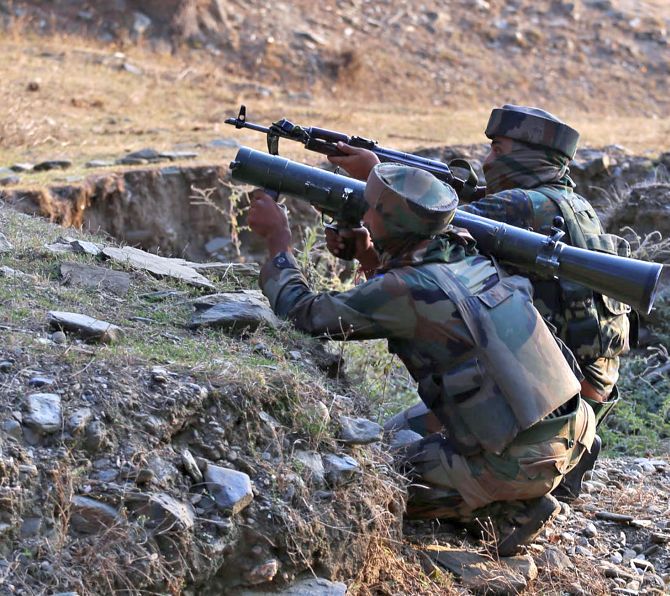'Pakistan has no strategic depth and is vulnerable to Indian military power without even crossing the border,' says Colonel Anil A Athale (retd).

IMAGE: Indian soldiers open fire across the Line of Control in Jammu and Kashmir.
Some analysts describe the India-Pakistan conflict as a 'communal riot with tanks'.
Every time India suffers casualties, there is a cry for revenge. At times, the firing on the Jammu and Kashmir border begins to resemble a family blood feud.
Yet there is a strategic dimension to it from the Indian side. India wants to raise the costs of Pakistani support to insurgency in the Kashmir valley (NOT the whole of J&K, but the Kashmir valley).
Thus, after the Uri attack in September 2016, the ceasefire agreed in 2003 lies shattered. India carried out surgical strikes inside Pakistan held Kashmir on September 28-29, 2016, 11 days after the Uri attack.
If the aim of the surgical strikes and firing on the border was to dissuade Pakistan from supporting insurgents in the Kashmir valley, then it has certainly failed in that objective.
The reasons for this are not difficult to analyse. The reality is that there is a near parity in conventional arms along the border between India and Pakistan.
Thanks to generous American military aid over the years, in some respects like gunfire detecting radars and even night devices, Pakistan actually enjoys technological superiority over India.
The national aim of Pakistan (not just its army) is to engage India in asymmetrical warfare in Kashmir where while Pakistan supports the insurgents, Indian conventional power is neutralised by the threat of escalation to nuclear war.
The examples of Israel firing into the Gaza Strip in retaliation are often invoked to justify Indian actions. But that is a fallacy as Israel enjoys huge superiority over the Palestinians, something not available to us.
Does that mean India has no option but to suffer in silence?
Far from it. We have several options to raise the costs of the Pakistani misadventure in Kashmir.
For a start, instead of firing on the border being episodic and only in retaliation, India could well make it a permanent feature of the Jammu and Kashmir border. With a large industrial base and indigenous production, India can sustain this indefinitely.
The second option for India is to saturate the area with fire power.
We have the numbers on our side and for each Pakistani gun, we can deploy three.
In addition, we have the option to use our defunct anti aircraft guns like L-60 in direct firing role for accurate targeting of Pakistani bunkers.
Students of military history know how German Field Marshal Erwin Rommel successfully used the 88 mm anti-aircraft guns in a ground role against the Allied tanks.
India also has the option to increase the 'depth' of our shelling.
Instead of confining ourselves to areas along the border, we can target the depth areas of Pakistan.
Here we have a distinct advantage in that our strategic targets are deep inside our territory while those of Pakistan are close to the border and within 30 km range. These can be neutralised by long range guns and rocket batteries.
But even more tellingly, we can use laboratory-level weapons, still under development, (beam weapons or fuel air explosives) on the battlefield to test their efficacy.
We have dedicated military satellites to give us real time information on targets. These can be used to neutralise Pakistan's retaliatory capability.
In short, the options we have include increasing intensity, spread, depth of our retaliatory firing.
India's forte -- Jugaad -- must be given free rein. The Indian Army is quite capable of surprising the enemy with its innovations.
But before any of these measures can be undertaken, there is need to build a national consensus on the measures to be taken. The political parties have to be on the same page and we have to be ready to accept some amount of damage to our own side as well.
Our shelling along the border south of Jammu, hits Pakistan's Punjabi heartland. It also gives a timely reminder to Pakistan that it has inherited a lousy geography whereby its strategic targets are within 30 kms of its eastern border with India.
Pakistan has no strategic depth and is vulnerable to Indian conventional military power without even crossing the border.
As Pakistani soldiers (mainly from Punjab) see the destruction of their own homes, the rank and file may well put pressure on the army leadership to change course.
To be effective, this bitter medicine needs to administered for longer periods of time. In short, we have to begin to be pro-active rather than reactive on the border.
This is a war that will be won by the side that shows greater resolve.











 © 2025
© 2025